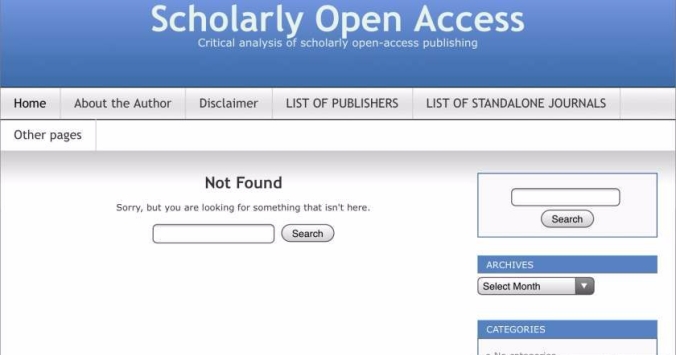
Unlike what most people had guessed, it was not a lawsuit from any of the predatory journal publishers that forced Jeffrey Beall, Librarian at the University of Colorado Denver and publisher of the famous Scholarly Open Access blog, to shut down the blog one fine day in January 2017, five years after he started it in January 2012. According to an Opinion piece published by him in the journal Biochemia Medica, the official journal of the Croatian Society of Medical Biochemistry and Laboratory Medicine, it was the “intense pressure” from his University and the “fear” of losing his job that forced him to shut down the blog.
“In January 2017, facing intense pressure from my employer, the University of Colorado Denver, and fearing for my job, I shut down the blog and removed all its content from the blog platform,” he writes in the journal.
Besides trying to convince him why their journals were genuine and should be removed from the list of predatory journals or the Watchlist, which listed borderline cases, the publishers of bogus journals also resorted to “more aggressive strategies” – cherry-pick university officials and bombard them with emails “denouncing” him and “making false accusations about his work, his ethics, and his ability to make judgments about journals and publishers”.
Others annoyed university officials with numerous emails and letters on how Prof. Beall was hurting their reputation. “They kept sending the emails to the university chancellor and others, hoping to implement the heckler’s veto. They tried to be as annoying as possible to the university so that the officials would get so tired of the emails that they would silence me just to make them stop,” he says.
Looking back, the predatory journal publishers’ strategies of bugging university officials with emails seem to have worked.
Since it is a special issue on predatory journals, he explains at length what he thinks are the reasons for the emergence of the Open Access movement and how predatory journals, using the Open Access model, are harming science with none to police them. Ironically, Prof. Beall, has chosen an Open Access journal to announce to the world the reasons for shutting down his blog this January!
Open Access
Researchers in India and science journalists like me have stood to gain immensely from the Open Access model. Ironically, India is also home to the largest number of predatory journals published in the world. And researchers, especially from State and private universities, have gamed the system and ensured that these journals not only survive but become a cottage industry in the country.
It was not by accident that India became the headquarters of predatory journal publishing and Indian researchers have been its loyal customers. It can be traced back to the University Grants Commission’s stipulation for recruitment. The UGC stipulations states: at the time of recruitment candidates should have published two research papers from his/her Ph.D. work, of which at least one must be in a refereed journal. Also, promotions are based on points awarded for publishing papers in journals with different impact factors (between 1 and above 10). With practically no peer reviewing system in place to evaluate the worthiness of the submitted manuscript, any trash gets accepted and published in a few days. Also, with fancy impact factors that predatory journals give themselves, the publishers were meeting the demands of the system. In this demand-supply situation, the predatory journal publishers have been playing the guarding angel for Indian researchers.
It is pertinent to say that researchers from several national institutions and government laboratories in India too have been publishing in these journals, some unknowingly but many intentionally. Many researchers from other countries, including the U.S. too have their papers published in such bogus journals.
It is in response to threat posed to science by predatory journals and to make the recruitment and promotion system based on number of papers published in respectful journals more meaningful that the UGC came out with a White list of journals. Sadly, the White list has included several predatory journals. So much for the White list.
Biochemia Medica where Beall published his article is state funded journal in form of Open Access, with peer review, but it’s not predatory because it is not gold open access. There is no article processing charge. It is funded by the MInistry of science. Beall is talking about predatory open access that publishes whatever for money. Beall is not against open access which is not a profit making business of rubbish science.
Unfortunately even respectful international journals charge heavily for publishing an article. They expect the author to meet the expenditure form the project grant or from the institute funds. Is it possible in India ? More over for certain subjects /topics one may not require funds/ project grants to produce a genuine paper. Only Brain, Library and Stationary .